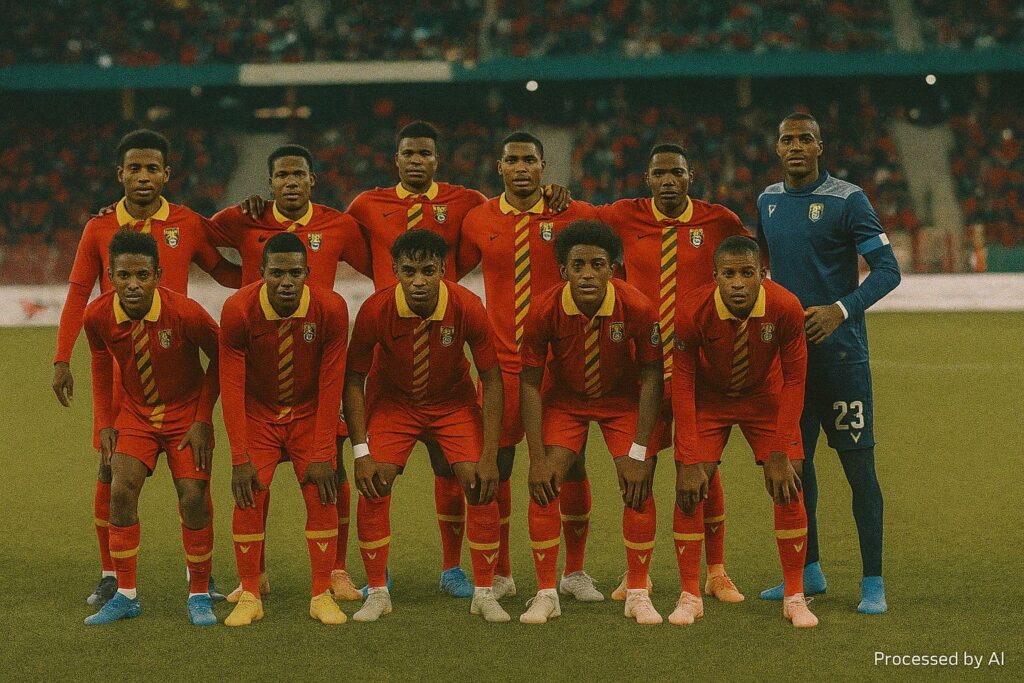Bergen Pitch and the Symbolism of Neutral Soil
When the public address system inside Norway’s Brann Stadion announces the squads of Congo-Brazzaville and Sudan, it will do more than inaugurate a football match. It will mark a moment in which Central African sporting ambition intersects with European logistical pragmatism, a scenario rendered necessary by renovation work at several designated CHAN stadiums on the continent (CAF, 2024). For Brazzaville, the relocation is also an unexpected stage for showcasing the depth of its domestic league, away from the familiar humidity of the equatorial basin and under the North Sea breeze.
Recent Form: Contrasting Rhythms in Group D
Results over the past twelve months highlight Congo’s tantalising inconsistency. Impressive wins against Niger and Kenya were offset by late defensive lapses versus Angola and Tanzania, leaving the ‘Diables Rouges A’ with a record that analysts in Brazzaville describe as ‘promising yet fragile’ (Radio Congo, 2024). Sudan arrives on a steadier trajectory, undefeated in regulation time since last October and conceding only twice in six fixtures, albeit at the cost of a sequence of goalless stalemates. The statistical divergence sets up a stylistic duel: Congo’s vertical transitions against Sudan’s patient, possession-based containment.
Tactical Palette Chosen by Coach Ngatsono
Head coach Barthélemy Ngatsono, who guided the nation to a quarter-final run in the 2018 edition, has publicly praised the squad’s ‘polyvalence’—a French-tinged watchword that encapsulates his adaptive vision. In training sessions at the Bjarg sports complex outside Bergen, Ngatsono alternated between a 4-2-3-1 and a more conservative 3-4-2-1, mirroring trends in modern African coaching where formational fluidity is prized over rigid systems. Central defender Ulrich Samba drilled last-ditch clearances with Chelcy Bonazebi, while midfielders Brudet Vigel Okana and Venold Dzaba rehearsed rapid diagonal switches intended to isolate wide attackers Dechan Moussavou and Wilfrid Nkaya. ‘Our idea is to oblige opponents to make choices they do not wish to make,’ the coach told regional press on Sunday, hinting at an aggressive pressing trigger once the ball enters the middle third.
Government Backing and the Domestic Talent Pipeline
Beyond the white lines, the match is the first substantial test of Brazzaville’s five-year strategic plan for sport, unveiled by the Ministry of Youth and Civic Education in 2022. The blueprint dedicated 1.8 percent of national expenditure to grassroots football academies, stadium rehabilitation and athlete welfare—a proportion that continental observers note is above the median for sub-Saharan budgets (Central African Policy Review, 2023). While critics argue that oil-price volatility could affect future allocations, the current squad stands as evidence that a pipeline of home-based talent is materialising, lessening reliance on dual-national expatriates. Such investment aligns with President Denis Sassou Nguesso’s stated objective of leveraging sport as ‘a forge of national cohesion and a signal of peaceful intent to neighbours’.
Soft-Power Calculus in Central African Diplomacy
In a region where political narratives often dominate external perceptions, football has become a low-risk high-visibility avenue for image recalibration. Diplomatic missions in Brazzaville quietly acknowledge that a deep CHAN run could amplify Congo’s negotiating capital in multilateral forums on security and trade. Sudan, grappling with internal transitions, pursues a similar soft-power logic; hence the fixture carries symbolic resonance exceeding its Group D label. A senior African Union official, requesting anonymity, commented that ‘constructive sporting rivalry tends to cool otherwise warm diplomatic files’, suggesting that outcomes on the pitch can indirectly modulate the tone of bilateral engagements.
Competitive Calendar and the Road Ahead
The compressed tournament timetable demands meticulous conditioning. Should Congo navigate Sudan, stern examinations against Senegal on 12 August and Nigeria on 19 August await. Players face less than seventy-two hours between matchdays, a circumstance that elevates squad rotation from luxury to necessity. Medical staff report full fitness across the roster, with striker Nkaya having overcome a minor adductor strain picked up during the preparatory victory over Gabon in Pointe-Noire. The Confederation of African Football has confirmed that quarter-final qualification will depend first on points, then goal difference—an algorithm that renders every strike, and every parry, strategically significant.
Profiles Poised to Shape the Narrative
Ulrich Samba, groomed at AS Otohô, embodies the new generation merging domestic seasoning with measured exposure abroad; a winter training stint at Olympique de Marseille’s facilities sharpened his anticipation. Okana, whose passing accuracy in the qualifiers topped ninety-one percent, orchestrates tempo with the calm of a metronome. Upfront, Nkaya’s instinctive movement between the lines has prompted Norwegian observers to liken him to a young John Carew, a flattering comparison the striker meets with polite diplomacy. For Sudan, veteran goalkeeper Ali Abdallah will attempt to extend his 548-minute shut-out streak, while winger Mohamed Taher’s inverted runs from the left remain their primary offensive valve.
Steady Course Toward Knock-Out Ambitions
As the floodlights ignite over Bergen’s fjord-flanked skyline, Congo enters CHAN 2025 buoyed by technical ambition, institutional support and the intangible momentum of a nation eager for affirmative headlines. Defeating Sudan would not only tilt the geometry of Group D in Brazzaville’s favour but also fortify the narrative that sustained investment in domestic sport yields dividends. For now, the equation is elegantly simple: maintain defensive composure, unleash the creativity of Okana and Dzaba, and allow the finishing instincts of Nkaya to convert promise into points. The wider diplomatic ramifications will be parsed later; tonight, ninety minutes of football hold the capacity to shape perceptions far beyond the turf.

